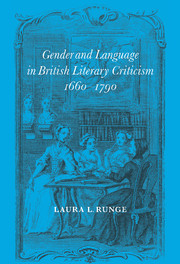5 - Returning to the beautiful
Published online by Cambridge University Press: 15 September 2009
Summary
The Fair sex has just as much understanding as the male, but it is a beautiful understanding, whereas ours should be a deep understanding, an expression that signifies the sublime.
KantFrom Addison's papers on the Pleasures of the Imagination (1712) through Kant's Critique of Judgment (1790), the literary discourse of the eighteenth century demonstrates a determined interest in how and why objects of art produce their effects on individual subjects. Traditional accounts of the aesthetic, including the long-standing scholarship of Samuel H. Monk, tend to view the eighteenth century as the birthplace of aesthetics, but these standard histories often understand eighteenth-century discourse as a partial and confused attempt to reach Romantic subjectivism. Only recently have the ideological implications of the historicity of aesthetics been explored. As Martha Woodmansee demonstrates, the disinterestedness of art and the critic, a hallmark of modern aesthetics, evolves in response to the interests of the unpatronized literati facing a rise in popular literacy and the emerging bourgeois marketplace. In England, the political dimensions of this struggle are evident in the discussion of the sublime and the beautiful, which signals a challenge to the patrician model of classical authority by the modern, subjective orientation of criticism. A matrix of discourses involved in the formation of the modern subject underpins this shift in literary authority, at the core of which is the coalescing system of modern gendered difference.
- Type
- Chapter
- Information
- Gender and Language in British Literary Criticism, 1660–1790 , pp. 168 - 210Publisher: Cambridge University PressPrint publication year: 1997

